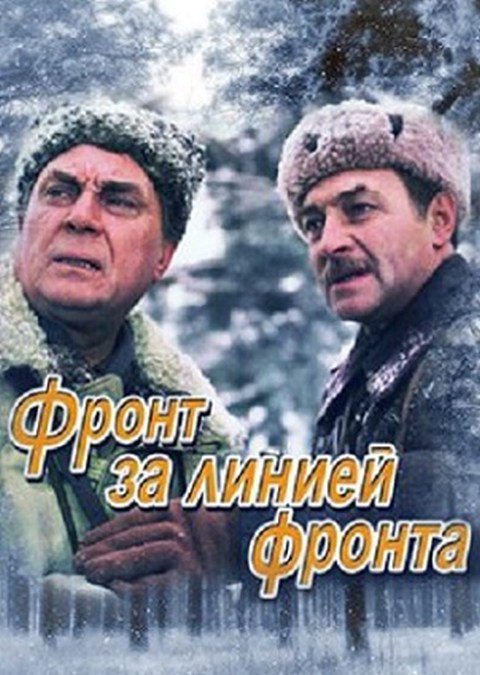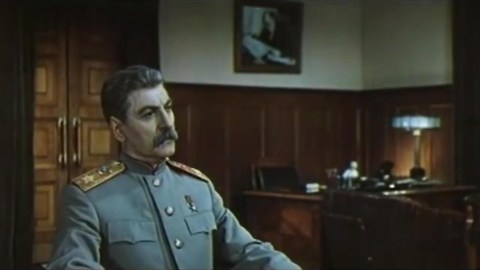17. 4. – 19. 4. 2026
Front Beyond the Front Line

 Original title: Фронт за линией фронта
Original title: Фронт за линией фронтаDirector: Igor Gostev
Production: 1977, USSR
Length: 174 min.
Screened:
KRRR! 2019: 70mm 2.2:1, Colours intact, MG, Spoken language: Russian, Subtitles: Czech, EnglishAnnotation for KRRR! 2019
The second part of the monumental war trilogy, based on Semyon Tsvigun’s novel We Will Return, takes us into the deep forests, where Major Mlynsky’s unit, in cooperation with partisans, liberates the Belarusian territory from the clutches of the German occupiers. According to Tsvigun, the film Front in the Rear is “a story about the courageous heroic deeds of Mlynsky’s unit. Over the past period, the unit has matured, matured and hardened in flames and gunpowder smoke, turning into a strong fighting unit. (…) I tried to show an exciting duel of two intelligence agencies, the outcome of which had a very serious impact on the fate of the offensive operations of our army. I tried not to show this duel as a series of meaningless adventures, but as complex and dangerous work, as a higher manifestation of political vigilance and courage.”
While Tsvigun offered a purely heroic‑epic conception of the saga, the director of the entire film trilogy, Igor Gostev, offered another point of view in his interpretation. The Front in the Rear is far from being just a pathetic story about the sheer heroism of Major Mlynsky's unit (and by extension, the entire Soviet army), but on the contrary, it contains very sophisticated espionage plot formulas, thanks to which we get much deeper into the whole problem and which depict the mutual relations between the main characters on both fronts in much more detail. This is also the key reason why such a branched plot seems compact and unified in many respects. It purposefully works with the characters' numerous motivations and builds a whole constellation of events around them – whether it is an investigation of an unknown place on the map or a skirmish with fake partisans led by the sinister Klein. It thus allows individual characters to develop internally.
The film ultimately offers an example of very sensitive work with a specific concept of war film, which had been developing in the Soviet Union for a long time. The contribution lies not only in the enrichment of another genre dimension, but also in the work with the heroes of the story. They do not represent stereotypical types moving in a black and white world of good and evil, but their actions, on the contrary, go beyond them, becoming the embodiment of the general qualities of bravery, prudence and deep patriotic feeling.
Annotation for KRRR! 2019
Even in partisan conditions, Major Mlynsky's unit has retained the character of a regular military unit, is directly subordinate to the front headquarters and performs important reconnaissance and diversionary tasks. Now it is to explore the German defensive line, which is preventing the further advance of the Red Army and endangers the communication system. During an attack on the railway station, Mlynsky's unit, in cooperation with the partisans, frees hundreds of Soviet citizens who are being taken to Germany. At the same time, Mlynsky obtains valuable information from a captured German courier. It concerns documents and a map that were left on a shot‑up train. Using an extensive illegal network, which also includes two members of the Wehrmacht, Mlynsky manages to obtain these materials. However, they lack information about Zone 27, and Mlynsky's people are tasked with investigating what is hidden behind this "white spot" on the map. Once again, a complex plan must be devised, which is carried out by the Soviet intelligence officer Afanasyev, playing the role of Captain Raisner. Although he pays for his action with his life, he manages to inform Mlynsky that the Germans have prepared an elaborate trap at this location, and that the plans that Mlynsky has seized were fake. The Germans took the Raisner case as a warning and deployed a special unit against Mlynsky, led by the thug Klein. Mlynsky is meanwhile summoned to Moscow, decorated, and promoted to colonel. After meeting with Stalin, he returns with new instructions. Another significant action of his unit is a duel with Klein, who is operating in the region with a fake partisan unit. The Soviet intelligence officer Shmil, who works as a radio operator for Klein, gives the Germans false information about the direction of the planned attack. When the attack occurs, but in a completely different sector, the German defensive line, which has been painstakingly built, is breached. Then Mlynsky's people eliminate Klein's unit, but Shmil also dies in the action. Mlynsky's mission on Russian territory ends. However, his experience is counted on in the next phase of the war, which is already taking place on Polish and Czechoslovak territory.
The main role of Ivan Mlynsky was created by Vyacheslav Tikhonov. The film was based on Semyon Tsvignov's novel We Will Return, although both parts of the film have a shorter time frame than the novel – from October 31, 1943 to June 22, 1944. Unlike the original, the film emphasizes the almost detective aspect of numerous combat plots.